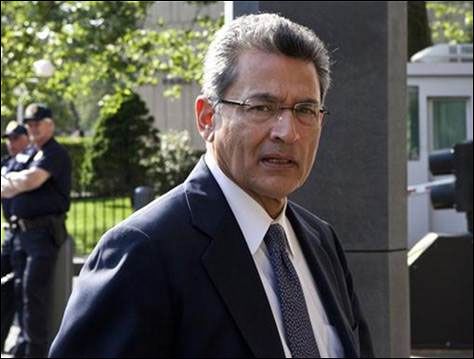
Pursuing yet another legal recourse, India-born former Goldman Sachs director Rajat Gupta has filed a fresh appeal in a US court against a federal judge's ruling that had denied his bid to throw out his two-year sentence and conviction on insider trading charges.
Gupta's lawyer Gary Naftalis filed the fresh appeal in the US Court of Appeals for the Second Circuit on Tuesday against the July 2, 2015 ruling by a District Court.
In the ruling, US District Judge Jed Rakoff had rejected Gupta's appeal to overturn his two-year sentence and conviction on insider trading, disagreeing with him that there was ‘insufficient’ evidence at trial of him receiving ‘personal benefits’ in exchange for the insider tips.
Rakoff had said that Gupta's argument that the evidence of personal benefit presented at trial was insufficient to sustain his conviction is ‘both too late and too little’.
Gupta, 66, was convicted in 2012 of passing confidential boardroom information to now jailed hedge fund founder Raj Rajaratnam.
Gupta appealed his conviction on various grounds, but the US federal Court of Appeals and even the Supreme Court rejected his arguments and affirmed the conviction.
Gupta is currently serving a two year prison term in a federal prison in Ayer, Massachusetts and is scheduled to be released in March next year.
In his appeal, Gupta had cited the Appeals Court recent decision in which it reversed the insider convictions of hedge-fund managers Todd Newman and Anthony Chiasson.
In the landmark ruling, the appeals court had ruled that for an insider trading conviction prosecutors must show that a defendant received a personal benefit for passing illegal tips.
Gupta is seeking to vacate his sentence and the judgment against him on the basis of an argument that the trial court's instruction to the jury concerning the ‘personal benefit’ element of an insider trading violation was ‘erroneous’ and there was insufficient evidence of such benefit.
Rakoff had earlier this month also denied Gupta's bid to seek a ‘certificate of appealability’ that would have given the IIT and Harvard alumnus another legal recourse to challenge his conviction.
Rakoff, who had presided over Gupta's 2012 trial and sentenced him to two years' imprisonment, had said that even though Gupta is a ‘man of many laudable qualities’, the ‘hard fact remains’ that he committed a serious crime.
Denying Gupta's motion for a certificate of appealability, Rakoff had said pursuing further legal options to challenge his conviction will serve no purpose.
Image: Rajat Gupta. Photograph: Reuters










 © 2025
© 2025